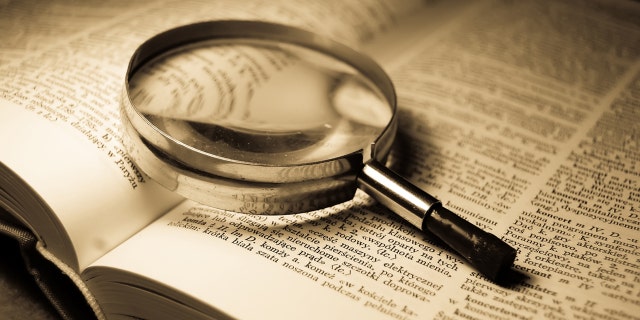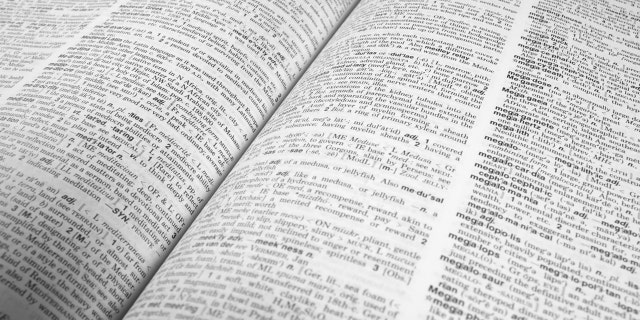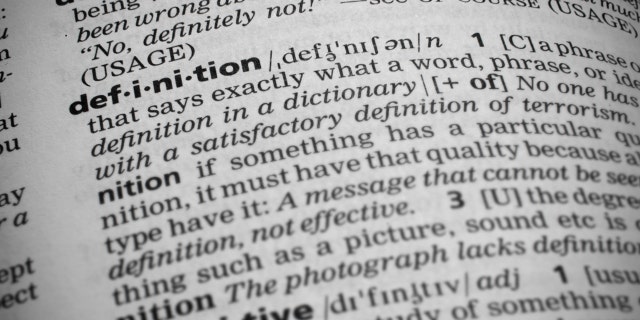Saturday is National Dictionary Day and what better way to celebrate than to learn a few facts about the resource book?
The U.S. celebrates National Dictionary Day on Oct. 16 every year in honor of the birthday of Noah Webster, considered to be the father of the American dictionary, according to Merriam-Webster.
According to the dictionary website, National Dictionary Day "celebrates language, emphasizes the importance of learning and encourages readers to use the dictionary to improve vocabulary."

Saturday is National Dictionary Day. The U.S. celebrates the holiday on Oct. 16 every year in honor of Noah Webster’s birthday. Webster is considered the father of the American dictionary. (iStock)
The website offers some ways to celebrate, including playing word games like crossword puzzles or word searches, hosting a spelling bee or learning a new word.
You can also celebrate by reading these interesting facts about the dictionary.
RARE US CONSTITUTION COPY UP FOR AUCTION EXPECTED TO FETCH $15M
The first English language dictionary was created in 1604
Robert Cawdry released "A Table Alphabeticall" in 1604, making it the "first single-language English dictionary ever published," according to the British Library. The resource book had about 3,000 words and "simple and brief descriptions."

The first English language dictionary was released in 1604 and the first American dictionary was published in 1806. (iStock)
The first American dictionary – "A Compendious Dictionary of the English Language" – was published in 1806 by Noah Webster, according to the Merriam-Webster website.
In 1828, Webster published "An American Dictionary of the English Language," which had 70,000 entries.
CLICK HERE TO GET THE FOX NEWS APP
No English dictionary contains every word in the English language
According to Merriam-Webster, it’s silly to rely on any single dictionary to contain every word in the English language, even though dictionaries "tend to be rather large books."
"There has never been, and never will be, a dictionary that includes all the words in English," Merriam-Webster said on its website.
According to the dictionary, some dictionaries leave out words that are out of date or irrelevant to most people.

Pneumonoultramicroscopicsilicovolcanoconiosis is generally understood to be the longest word in the English language, with 45 letters. (iStock)
Words aren’t decided by lexicographers
According to the Merriam-Webster website, different dictionaries have various criteria for adding words. However, the general rule for adding or removing a word from the dictionary depends on data surrounding how often a word is used.
"If enough people use a certain word in a certain way for a certain length of time (or if it has substantial currency in a particular field, such as medicine) it will be added to a dictionary," Merriam-Webster writes on its website.
CLICK HERE TO SIGN UP FOR OUR LIFESTYLE NEWSLETTER
The longest word in the English language has 45 letters
Pneumonoultramicroscopicsilicovolcanoconiosis is generally understood to be the longest word in the English language, with 45 letters. The word refers to a lung disease, according to Lexico.
Other words considered to be among the longest in the dictionary are antidisestablishmentarianism (a 28-letter word referring to the "opposition to a breaking away from an established church," according to Dictionary.com) and floccinaucinihilipilification (a 29-letter word meaning "the estimation of something as valueless," according to Dictionary.com).

Eunoia, which means "beautiful thinking" according to Guinness World Records, is the shortest word in the English language that has all five main vowels. (iStock)
FOLLOW US ON FACEBOOK FOR MORE FOX LIFESTYLE NEWS
The shortest word with all five vowels in the English language is just 6 letters
Eunoia, which means "beautiful thinking" according to Guinness World Records, is the shortest word in the English language that has all five main vowels.
Of course, the two shortest words in the entire English language are "I" and "a", with just one letter each. According to Lexico, there are 103 two-letter words.
No comments:
Post a Comment